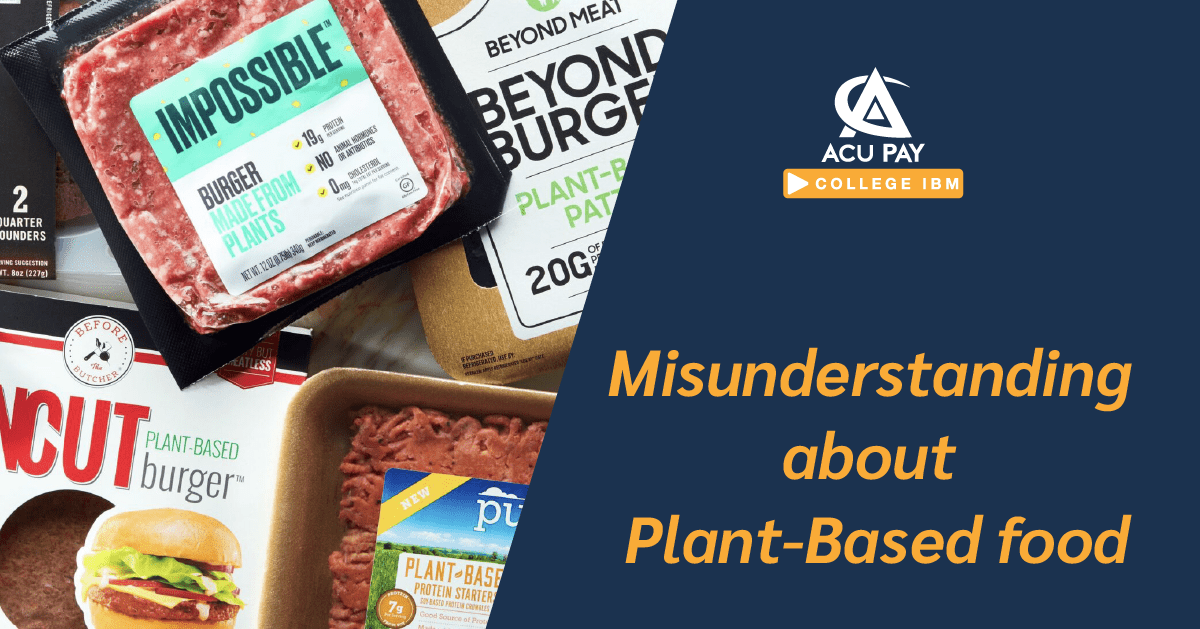

‘Plant-based’ is one of the options of food for new generation people who want to take care of themselves more. Nevertheless, there is still some misunderstanding for some people about the plant-based food and this time, ACU PAY will clear all of the doubts for you guys.
Plant-based food is a diet that is based on plants instead of consuming protein from meat. Plant-based diets include not only seasonal vegetables and fruits, but also cereals, and non-processed or least processed natural foods. Eating plant-based foods is an alternative for those who want to supplement protein but want to avoid protein sources from meat. At present, there are a lot of plant-based products such as Plant-based protein or Plant-based meat that do not contain meat, milk, eggs, or honey and maintain the nutritional value that the bodies need.
Eating plant-based foods is not a vegetarian diet that avoids eating all meat, milk, or dairy products. Plant-based eating is consuming a diet that mainly focuses on the proportion of vegetables, fruits, and grains while still eating meat, seafood, or milk in a smaller proportion.
Many people misunderstand this. Plant-based products are actually full of protein, but they may need to be eaten more to match the amount of protein found in animal products. For example, you need to consume one cup of cooked beans to equal 85 grams of protein in meat. The body usually needs a gram of protein per kilogram of body weight.
If you are worried about not getting enough protein, you can add more plant protein powder to your breakfast to maintain your daily intake.
In fact, a normal diet is sometimes not completely nutritious. Eating plants may be deficient in certain vitamins, such as vitamin B12 or iron, but it is easy to supplement these nutrients through a daily diet of plant-based foods such as milk, cereals, or other supplements.
Not all plant-based foods make us healthy, as many plant-processed foods contain high amounts of sugar, salt, and saturated fat, such as Oreo which is a vegetarian-friendly food.
In addition, health experts unanimously agree that a diet consisting of fruits, vegetables, nuts, and the least processed grains is best for health, but this does not mean that all plant-based foods meet these requirements.
For example, french fries, potato chips, fried onions, cupcakes, and cereal that contain sugar. Although there are no animal products, what we have in common is that these foods don’t do much for our bodies.
In fact, cow’s milk is not only the best source of calcium. Dark green leafy vegetables such as kale, bok choy, and mustard greens, are the good source of calcium. Even fruit juices, especially orange juice and alternative milk can help us increase and supplement our calcium intake.
Many people believe that eating too much soy may increase the risk of breast cancer, but experts from the American Cancer Society have announced that it is safe for both women and men to consume. There is growing evidence that eating traditional soy foods such as tofu, tempeh, Edamame, miso, and soy milk may reduce the risk of breast cancer, especially among Asian women.
Soybean food is an excellent source of protein, especially when replacing other less healthy foods such as animal fat and red meat or processed meat. A soybean diet also reduces heart disease rates and may reduce cholesterol.
In conclusion, whether it’s plant-based or animal-based food, as long as we eat enough calories to keep our weight healthy and eat a healthy diet, only if those diets suit, we can eat whatever we want to.